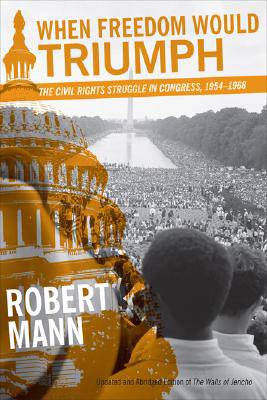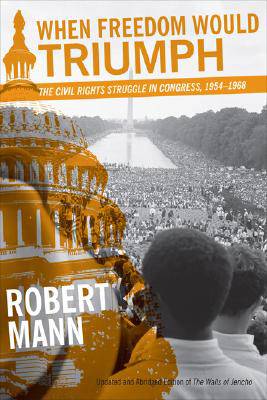
- Retrait gratuit dans votre magasin Club
- 7.000.000 titres dans notre catalogue
- Payer en toute sécurité
- Toujours un magasin près de chez vous
- Retrait gratuit dans votre magasin Club
- 7.000.000 titres dans notre catalogue
- Payer en toute sécurité
- Toujours un magasin près de chez vous
Description
When Freedom Would Triumph recalls the most significant and inspiring legislative battle of the twentieth century -- the two decades of struggle in the halls of Congress that resulted in civil rights for the descendants of American slaves. Robert Mann's comprehensive analysis shows how political leaders in Washington -- Lyndon Johnson, Hubert Humphrey, John F. Kennedy, and others -- transformed the ardent passion for freedom -- the protests, marches, and creative nonviolence of the civil rights movement -- into concrete progress for justice. A story of heroism and cowardice, statesmanship and political calculation, vision and blindness, When Freedom Would Triumph, an abridged and updated version of Mann's The Walls of Jericho: Lyndon Johnson, Hubert Humphrey, Richard Russell, and the Struggle for Civil Rights, is a captivating, thought-provoking reminder of the need for more effective government.
Mann argues that the passage of civil rights laws is one of the finest examples of what good is possible when political leaders transcend partisan political differences and focus not only on the immediate judgment of the voters, but also on the ultimate judgment of history. As Mann explains, despite the opposition of a powerful, determined band of southern politicians led by Georgia senator Richard Russell, the political environment of the 1950s and 1960s enabled a remarkable amount of compromise and progress in Congress. When Freedom Would Triumph recalls a time when statesmanship was possible and progress was achieved in ways that united the country and appealed to our highest principles, not our basest instincts. Although the era was far from perfect, and its leaders were deeply flawed in many ways, Mann shows that the mid-twentieth century was an age of bipartisan cooperation and willingness to set aside party differences in the pursuit of significant social reform. Such a political stance, Mann argues, is worthy of study and emulation today.
Spécifications
Parties prenantes
- Auteur(s) :
- Editeur:
Contenu
- Nombre de pages :
- 352
- Langue:
- Anglais
- Collection :
Caractéristiques
- EAN:
- 9780807132500
- Date de parution :
- 01-09-07
- Format:
- Livre broché
- Format numérique:
- Trade paperback (VS)
- Dimensions :
- 152 mm x 226 mm
- Poids :
- 544 g







